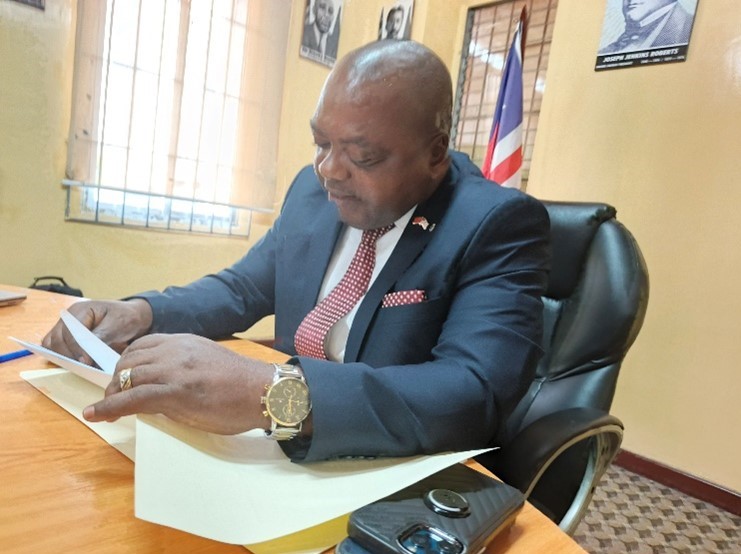The president of the Liberian National Bar Association (LNBA), Cllr. Bonor M. Varmah, found himself embroiled in controversy following his public criticism of a Supreme Court ruling regarding a leadership dispute in the House of Representatives. Varmah’s statement, issued on April 28, 2025, sparked immediate backlash from prominent lawyers who accused him of breaching ethical standards and undermining the court’s authority. The lawyers called for contempt charges against Varmah, arguing that his actions jeopardized the rule of law and the integrity of the judicial process. The core of the dispute revolved around the Supreme Court’s interpretation of Articles 33 and 49 of the Constitution concerning the election and authority of the Speaker of the House.
Several senior lawyers, including Senator and Cllr. Augustine S. Chea, Cllr. Arthur T. Johnson, and Cllr. Jonathan Massaquoi, publicly condemned Varmah’s statement. Cllr. Chea, in a Facebook post, expressed shame for his profession and argued that Varmah’s logic mirrored that of the contested “Majority Bloc” in the House. He challenged Varmah’s assertion that the Supreme Court’s acceptance of payments from the budget passed by the “Majority Bloc” legitimized their authority. Chea further dissected the legal nuances of the Supreme Court’s rulings, explaining the interchangeable use of “ultra vires” and “unconstitutional” to describe actions exceeding constitutional authority. He criticized Varmah’s interpretation of the situation, arguing that the Speaker had requested clarification which the Court provided. Furthermore, Chea questioned Varmah’s suggestion that the Executive branch had discretion over enforcing Supreme Court decisions, emphasizing the constitutional provisions for electing a Speaker.
Cllr. Johnson accused Varmah of directly undermining the Supreme Court, a sentiment echoed by other legal professionals. Cllr. Massaquoi, former Executive Director of the Office of War and Economic Crimes, issued a strongly worded statement, labeling Varmah’s actions as “legally flawed, misguided, deeply troubling, and inconsistent with the ethical responsibilities of the Bar.” He highlighted the sub judice rule, which prohibits public commentary on active court cases to prevent prejudice and protect the impartiality of the judicial process. Massaquoi argued that Varmah’s statement violated this principle and represented an attempt to denigrate the Supreme Court. He emphasized the constitutional guarantees of due process and judicial independence enshrined in Articles 21(h) and 65 of the Liberian Constitution.
At the heart of the controversy was the Supreme Court’s December 6, 2024 ruling, which declared legislative actions not conforming to Articles 33 and 49 of the Constitution as “ultra vires.” The LNBA, under Varmah’s leadership, contended that the Court overstepped its bounds by using a Bill of Information to effectively reopen and re-rule on a settled matter. Varmah insisted that a Bill of Information should only clarify an existing judgment, not introduce new constitutional interpretations. He argued that the Court’s decision, if left unchallenged, would invalidate the 2025 National Budget and all related expenditures, leading to a “criminal subversion of the government.” He called for the Court to reverse its decision, warning of potential instability and a dangerous precedent of judicial overreach into political matters.
Varmah’s stance was based on his interpretation that House sessions held without the recognized Speaker, Jonathan Fonati Koffa, were illegitimate. He asserted that the subsequent passing of the national budget during these sessions was therefore void. He argued that the Supreme Court’s ruling effectively endorsed this illegitimacy, with far-reaching consequences for government operations and financial stability. He framed the issue as a critical juncture for the separation of powers, warning of the dangers of judicial interference in political processes.
The public rebuke from prominent legal figures underscored the gravity of Varmah’s actions. They highlighted the importance of upholding the sub judice principle, respecting the authority of the Supreme Court, and maintaining the integrity of the judicial process. The controversy exposed a deep division within the legal community regarding the role of the judiciary in resolving political disputes and the boundaries of permissible public commentary on ongoing legal proceedings. The incident raised fundamental questions about the balance of power between different branches of government and the responsibility of legal professionals to safeguard the rule of law.


